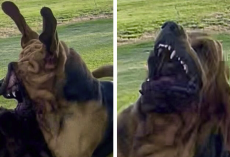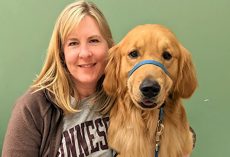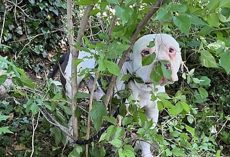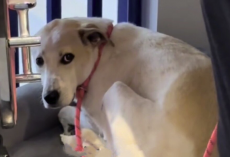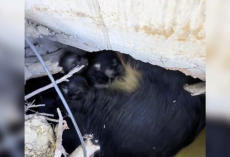Moose is the cutest little howler and dad does a good job for a human.
Teach a Beagle Puppy to Howl: Simple Tips for Success
Beagle puppies are known for their unique howling abilities. If you’re a proud owner of a beagle puppy, you might be wondering how to teach your furry friend to howl on command.
Teaching a beagle puppy to howl can be an exciting and fun experience for both you and your pet.
To start, it’s important to understand that beagles are natural howlers. They howl to communicate with each other and to express their emotions.
Therefore, teaching your beagle puppy to howl is not about teaching them a new skill, but rather about channeling their natural instincts in a positive and controlled way.
With patience and consistent training, you can help your beagle puppy develop their howling skills and bond with them in the process.
There are different methods you can use to teach your beagle puppy to howl, such as using a howling cue or rewarding them when they howl naturally.
It’s also important to create a positive and comfortable environment for your puppy to feel safe and confident enough to express themselves.
With these tips and techniques, you can successfully teach your beagle puppy to howl and enjoy the unique bond that comes with it.
Understanding Beagle Puppies
Beagle puppies are known for their playful and curious nature. They are intelligent dogs that require a lot of attention and care. To train a Beagle puppy to howl, it is important to understand their behavior and needs.
Socialization
Beagle puppies are social animals and need to be properly socialized from a young age. They should be exposed to different people, animals, and environments to help them become well-adjusted and confident dogs. Socialization also helps prevent behavioral problems such as aggression and anxiety.
Exercise
Beagle puppies are energetic and require regular exercise to keep them healthy and happy. They should be taken for daily walks and have access to a secure outdoor area to play and explore. Lack of exercise can lead to destructive behavior and health problems.
Training
Beagle puppies are intelligent and eager to please, making them relatively easy to train. Positive reinforcement methods such as treats and praise should be used to encourage good behavior. Consistency and patience are key when training Beagle puppies.
Health
Beagle puppies are prone to certain health issues such as hip dysplasia and ear infections. Regular visits to the vet and proper grooming can help prevent these problems. It is important to provide a healthy diet and plenty of fresh water to keep Beagle puppies in good health.
Overall, Beagle puppies are lovable and playful dogs that require attention and care. Understanding their behavior and needs is essential to successfully train them to howl and become well-behaved adult dogs.
The Importance of Howling
Howling is an innate behavior in dogs, and it serves several purposes. For Beagles, howling is a way to communicate with their pack members, and it can also be a sign of distress or boredom. Here are some reasons why howling is important for Beagles.
Communication
Beagles are pack animals, and howling is one of the ways they communicate with their pack members. Howling can convey a range of emotions, from excitement to fear. It can also be a way to locate other pack members when they are separated.
Expressing Emotions
Beagles are known for their expressive personalities, and howling is one way they express their emotions. A Beagle may howl when they are happy, sad, or anxious. By howling, they are able to communicate their feelings to their pack members.
Alerting their Owners
Beagles have a keen sense of hearing, and they can hear sounds that humans cannot. When they hear something unusual, such as a car alarm or a person approaching the house, they may howl to alert their owners. This can be helpful in keeping the home and family safe.
Relieving Boredom
Beagles are active dogs that require plenty of exercise and mental stimulation. When they are bored or restless, they may howl to release pent-up energy. Teaching a Beagle to howl on command can provide a fun and engaging activity for both the dog and the owner.
In conclusion, howling is an important behavior for Beagles, and it serves several purposes. By understanding the reasons why Beagles howl, owners can better communicate with their dogs and provide them with the mental and physical stimulation they need to thrive.
Initial Steps to Teach Howling
Teaching a beagle puppy to howl can be a fun and rewarding experience for both the puppy and the owner. Here are some initial steps to get started:
- Establish a bond with your puppy: Before you can begin teaching your beagle to howl, it’s important to establish a strong bond with your puppy. Spend time playing with your puppy, taking them on walks, and giving them plenty of attention and affection.
- Observe your puppy’s behavior: Pay attention to when your beagle naturally howls. This can be when they hear a siren or another dog howling in the distance. Take note of what triggers their howling and use this as a starting point for teaching them to howl on command.
- Choose a command word: Decide on a word or phrase that you will use to cue your beagle to howl. This can be something like “howl” or “sing”. Be consistent with the command word you choose and use it every time you want your beagle to howl.
- Reward your puppy: When your beagle does howl on command, be sure to reward them with praise and treats. This will reinforce the behavior and encourage them to continue howling on command.
- Practice regularly: Consistency is key when it comes to teaching your beagle to howl. Practice the command regularly, but don’t overdo it. Be patient and give your puppy time to learn and get comfortable with the command.
By following these initial steps, you can begin to teach your beagle puppy to howl on command. Remember to be patient and consistent, and always reward your puppy for their efforts.
Using Toys and Games
Beagles are highly energetic and playful dogs. Using toys and games can be an effective way to teach them how to howl. Here are some tips on how to use toys and games to train your beagle puppy to howl:
Choosing the Right Toys
When choosing toys for your beagle, it’s important to select ones that are durable and safe. Beagles are notorious for being tough chewers, so make sure the toys you choose can withstand their strong jaws. Toys made of rubber or nylon are good options. Avoid toys that are small enough to be swallowed or have small parts that can be easily chewed off.
Toys that make noise, such as squeaky toys or balls with bells inside, can be effective in encouraging your beagle to howl. You can also try toys that have a built-in howling sound, which can help your beagle associate the toy with the behavior you want them to learn.
Incorporating Games
Playing games with your beagle can be a fun way to teach them how to howl. One game you can try is the “howling game.” Start by making a howling sound yourself, and then encourage your beagle to join in. When they howl, reward them with a treat or praise. Repeat this game several times a day, gradually increasing the duration of the howling.
Another game you can play is the “hide-and-seek” game. Hide a toy that your beagle likes and encourage them to find it. When they do, make a howling sound and reward them with a treat or praise. This game can help your beagle associate the howling sound with a positive experience.
Remember, beagles are social animals and enjoy spending time with their owners. Incorporating toys and games into your training routine can help strengthen the bond between you and your beagle while also teaching them how to howl.
Introducing Other Dogs
When it comes to introducing a Beagle puppy to other dogs, it is important to do so in a safe and controlled environment. Beagles are naturally social dogs and generally get along well with other dogs. However, like any breed, they may have their own preferences and personalities that may affect how they interact with other dogs.
One important thing to keep in mind is that Beagles are pack animals and have a strong sense of loyalty to their pack members. This can be a good thing when introducing them to other dogs, as they may be more inclined to form positive relationships with them. However, it can also lead to possessive behavior, so it is important to monitor their interactions and intervene if necessary.
When introducing a Beagle puppy to other dogs, it is best to start with a neutral territory, such as a park or a backyard. Keep the dogs on a leash and allow them to sniff each other while closely monitoring their behavior. If they show signs of aggression or discomfort, separate them and try again another time.
It is also important to socialize Beagle puppies at a young age to help them develop positive relationships with other dogs. This can include regular playtime with other dogs, obedience classes, and exposure to different environments and situations.
Overall, introducing a Beagle puppy to other dogs can be a positive and rewarding experience for both the puppy and their owner. With proper socialization and monitoring, Beagles can form strong bonds with other dogs and become great companions.
Consistency and Patience
Teaching a beagle puppy to howl requires consistency and patience. Beagles are known for their stubbornness, so it is important to remain calm and consistent during the training process. Here are some tips for teaching a beagle puppy to howl:
- Start with short training sessions: Beagle puppies have a short attention span, so it is important to keep training sessions short and engaging. Start with five-minute training sessions and gradually increase the length of the sessions as your puppy becomes more comfortable with the training process.
- Use positive reinforcement: Beagles respond well to positive reinforcement, so it is important to reward your puppy when they exhibit the desired behavior. Use treats, praise, and affection to reinforce good behavior.
- Be patient: Teaching a beagle puppy to howl takes time, so it is important to be patient and persistent. Do not get frustrated if your puppy does not learn the behavior right away. Instead, remain calm and continue to work with your puppy.
- Practice regularly: Consistent practice is key to teaching a beagle puppy to howl. Practice the behavior every day, and gradually increase the difficulty of the training sessions as your puppy becomes more comfortable with the behavior.
By following these tips, you can teach your beagle puppy to howl with patience and consistency. Remember, every puppy is different, so it is important to tailor your training approach to your puppy’s individual needs and personality.
Dealing with Challenges
Beagles are known for their howling, but teaching a beagle puppy to howl on command can be challenging. Here are some common challenges and how to deal with them.
Excessive Howling
Beagles are a vocal breed, and excessive howling can be a problem if not addressed early on. If your beagle puppy is howling excessively, it could be due to boredom, anxiety, or lack of exercise.
To address excessive howling, make sure your beagle gets enough exercise and mental stimulation. Provide plenty of toys and playtime, and consider crate training to give your puppy a safe place to relax. If the howling continues, consult with a professional dog trainer or behaviorist.
Lack of Interest
Some beagle puppies may not be interested in howling, which can make training difficult. If your puppy is not responding to your commands, try using treats or toys as positive reinforcement. Be patient and consistent with your training, and don’t force your puppy to howl if they are not interested.
If your beagle puppy still shows no interest in howling, consider finding other ways to bond and train with your puppy. Beagles are intelligent and can learn a variety of tricks and commands, so explore different training methods to find what works best for your puppy.
Celebrating Progress
Teaching a beagle puppy to howl can be a fun and rewarding experience for both the puppy and the owner. Celebrating progress is an important part of the training process, as it reinforces positive behaviors and encourages the puppy to continue learning.
One way to celebrate progress is to use treats and praise. When the puppy successfully howls on command, reward them with a treat and lots of verbal praise. This positive reinforcement will help the puppy associate howling with good things, making them more likely to continue the behavior.
Another way to celebrate progress is to track the puppy’s development. Keep a log of how often the puppy howls on command and how long they can sustain the howl. This will help the owner see how the puppy is progressing over time and provide motivation to continue the training.
It’s important to remember that progress may not always be linear. Some days the puppy may struggle with the command, while other days they may excel. It’s important to remain patient and consistent with the training, celebrating even small successes along the way.
Overall, celebrating progress is an important part of teaching a beagle puppy to howl. By using positive reinforcement and tracking the puppy’s development, owners can encourage their puppy to continue learning and have fun in the process.
Conclusion
In conclusion, teaching a beagle puppy to howl can be a fun and rewarding experience. It is important to remember that not all beagles will be interested in howling, and some may take longer to learn than others.
Using the capture method, siren method, or music method can be effective ways to encourage your beagle to howl. It is important to start training your beagle at a young age and to provide enough exercise to keep them healthy and happy.
Additionally, it is important to understand why beagles howl and to address any underlying issues such as pain or fear. Beagles are known for their howling tendencies, but it is important to remember that excessive howling can be a sign of distress.
Overall, with patience and consistency, you can teach your beagle puppy to howl and enjoy the unique sound of their signature howl.


